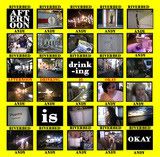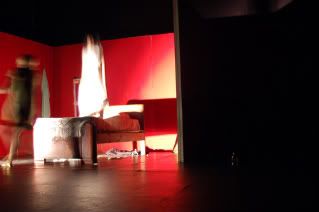There was once a man who owned a plastic piggy-bank. This piggy-bank’s plastic was of a thickness that made it impossible to see through into its interior. Even after holding this piggy-bank to the sky, hoping the glare of the sun, the warmness-giver, would give him an idea of its contents, he could see nothing. But the man did not worry about this. He found the piggy-bank to be so beautiful. The piggy-bank excited the man. He had never felt the way he felt during those spare moments in which he held the piggy-bank in his hands. But there was one issue. This piggy-bank was known by many other men. Those men as well seemed not to care that they could not see into the piggy-bank’s insides. This man, the man of our story, did not allow the idea of his piggy-bank being shared by other men to dissuade him. Everyday, he would set off on his way with his earnings of the previous day, and he would invest in this piggy-bank. Soon, he was not paying rent, his electricity was cut-off, he had no running water, and was not eating, but he believed that he was fulfilling the piggy-bank. One day, he spoke to the piggy-bank, but it did not answer. He held the piggy-bank, and felt warm, but then wondered to himself, If I have invested into this piggy-bank, why does it weigh so lightly? He shook the piggy-bank, but heard none of his money inside it. He neither heard the investments of the other men whom he knew were also investing in his piggy-bank. He turned the piggy-bank over and saw that under it, where its plump, smooth belly should be, was a hole. The man realized that his piggy-bank was nothing more than a drain, and that his investment would be forever lost.
How I came to realize that I was no longer writing for the Fine Print
Last semester, I was “writing” for the Fine Print, the University of Florida’s student-run, independent newspaper. It focuses on D.I.Y. subjects, and has a more liberal-minded swing to it. I had a review of the third issue of the Agricultural Review published there, a poem posted up on their blog, and was going to have a review of Tao Lin’s Shoplifting from American Apparel, and of Zachary C. Bush’s Angles of Disorder published in the upcoming months. Those reviews never happened, and never will, on the Fine Print for various reasons.
A bit after my first review was published by the Fine Print, a friend of mine (and other contributing Fine Print writer) held a party to raise money for farm workers. She said she was looking for bands to play, and I was told that if my band showed up, we could play. We maneuvered a lot to make it happened, but we were ready to play. My drummer was setting up the drum set, and a piece of it broke in his hand. That is what happened, but the owner of the set (I guess, because I really didn’t know who he was, but who also happened to be one of the tenants) started accusing us of breaking his set. At the moment I couldn’t consider his accusations, thinking, How could we have broken anything if we haven’t played yet? He said things like, “I’m not saying you broke it, but if you did, you should admit it.” And we responded, “But you are saying we broke it, and we haven’t even played yet. So how could we have broken it?” As I look back, now, all I can conclude is that whatever drum piece broke was already fucked up and meant to break soon, because Rilly is a very careful drummer, and never breaks things (that’s my job). We did not break that equipment, yet were blamed. Anyway, there were kegs at the party, and we had all been drinking a lot for free, so I was getting uppity. I just told the guy (because another friend of ours, who had lent us everything we were going to play with, who had gone to his home and carried that equipment to the house to have us play, who would then have to carry it all home alone because we were vanished), “Fine. We won’t use your drum set. We’re going to go to this kid’s house, get his drums, and then we’ll play.” The tenant wasn’t having that, and told me, “No, you’re not going to play in my house at all.” At this point I came to see this guy was just a power-tripping, little bitch, and I told him, “Fine, we won’t play, but you’re a little bitch.” To which he responded by telling me that I had to leave the house. And I told him I would, and then spat on his face. After that there was a shove and I let my fist talk the rest for me. I punched him. I am not proud of this, of resorting to violence, but that kid definitely deserved the bitchness punched out of him. Some other kid jumped in, and started hitting me, and soon I was combating multiple people, until Matty jumped in, yelling, and I ended up even hitting him (our glasses being knocked off). I snuck out of that and picked up Matty’s glasses, picked up mine, and walked to the other side, where I continued to hear yelling, and people trying to rationalize the situation. We were corralled outside, and as we tried to get on our bikes to leave, the tenant whom I punched, and his other roommate kept on “rationalizing” what had happened by saying things like, “This did not have to happen this way,” and bla bla bla. Basically, they were antagonizing us by bullshitting us, and we were just getting angrier and angrier. We wanted to leave, and the fucking little bitches kept on talking to us. I threatened to rape him, to stick my balls up into his asshole. One roommate said, “Man, I was just chilling in my room smoking from my bong, and all of the sudden there’s this fight.” I called him a fucking hippie, and clarified, on their request for what that mean, and said, “It means fuck you, and shit the fuck up!” Of course they didn’t shut up, and kept on with their “rationalizing” of the situation. Personally, once the fists have flown, rationalizing is pointless, and it should just end and people should go on their separate paths. They weren’t letting it end, and just pissing us off more and more.
Now, who was right, who was wrong? I sure wasn’t right in punching the kid, but I am not sorry. He wasn’t right in being a power-tripping bitch, but I doubt he’s sorry, either. Point being, student activists and St. Dad do not mix.
It also turns out that one of the tenants of the house happened to be one of the editors of the Fine Print, and when I went on campus in the following weeks, the editors, who always were pretty cool with me, were acting very awkwardly towards me, but never did they say anything about the occurrence. I spoke to my friend who told me we could play, explained the situation, and told her I was sorry, to her, not for what I did, but for possibly getting her in bad water for knowing us. Eventually I uploaded the Lin review onto the website where the editors edit the pieces for upcoming issues. I never got a response about it. I even messaged about feeling unhappiness towards me. No response. I never finished up the review for personal reasons, expecting to get a message about the deadline, just as I had received about the Agriculture Review review, but nothing. A few weeks later, when I had decided to finish the review because I felt it should be due soon, I went to the Fine Print’s site, and didn’t see my review up there, found that strange, but uploaded it again, this time writing something like, “I thought I had uploaded this earlier this month, but I guess I was wrong, so here it is again. Any suggestions are welcome.” Once again, no response. A few days later, I walk on campus and there they are, giving out copies of the new issue of the Fine Print. I was never told about the deadline. I don’t even think I was told the new issue was coming out. So, I see the editor giving out issues, and she doesn’t say much to me other than an awkward “Hi,” and my friend, who had helped us get equipment to the fateful house, was there and asked me to give out issues. And so I helped out, going up to people on that ugly, cloud-covered, rainy day, and telling them, “Take an issue, it’ll make your day better.” I hung out for about an hour and a half and helped them give out issues of the new Fine Print, the new issue whose deadline I was never made aware of, and came to realize that I was no longer writing for the Fine Print.
The review of Shoplifting from American Apparel that was supposed to be printed in some issue of the Fine Print
This novella’s action is focused around two shoplifting events, gmail chats, and a reading during Gainesville’s The Fest, but the “true” story lies within the interpersonal interactions between the protagonist, Sam, a writer living in New York, and those he encounters during his journey. Throughout the novella, Sam doesn’t “really” do anything, just kind of falls into events: jail, sex and kissing, Gainesville. There are interactions in which things are implied, but nothing’s ever really said directly. Lin says things the characters are thinking and feeling through minimal description of these humans’ interactions.
Early in the novella, we run into this passage on page 19:
“‘Oscar Wilde said that a genius is a spectator to their own life, to the point that the real genius is uninteresting,’ said Luis.”
This sets up the subject of the novella, the writer himself, Tao Lin. This novella, from my understanding, is Lin’s most autobiographical work.
But there’s another story underlying the occurrences of this novella, the story of Sam and his ex-girlfriend, Sheila. On page 13, Lin drops the first hint:
“Sam tried to guess the password to Sheila’s email account, not thinking he would be successful, and not being successful…”
Nothing else is said about Sheila, or about Sam’s feelings or thoughts of Sheila until page 79, where Sam is talking with Robert, a friend of Sam’s through gmail chat:
“Robert said Sheila called twice earlier from the mental hospital, and that he gave her Sam’s phone number and told her to call Sam.”
Here we are clued into what might’ve happened. Is Sam no longer with Sheila because she went crazy? Why did she go crazy? When Sam was trying to get into her email account, was he worried about her and just wanted to feel reconnected to her, or was he trying to find out if she was hiding something from him?
Lin then writes:
“’I wonder if she’ll get better. I felt sad. Connie was here. I felt funny about the situation. Later when Connie said things like ‘why are you sad,’ I could say nothing and she would say things like, ‘are you worried about your friend.’’
‘Ha ha,’ said Sam. ‘’Concrete reason.’’
‘Yes’, said Robert. ‘’Easy to understand.’’
They talked about Sheila for a few minutes.”
Here, Lin is minimizing what could be considered “deep” feelings. In this manner, I’m even more intrigued about this dynamic, the Sam and Sheila dynamic. It’s the most interesting part to me. I felt as if it came out of nowhere, but it was there the entire time, hiding under Lin’s style. I think that to push this subject matter would be overwhelming, but Lin’s extreme minimalism does it well. It’s too subtle to overwhelm. But it’s there. “Deep” feelings are present while one thinks one’s just reading some petty gmail chat between some hipsters.
On page 83, an “out-of-control butterfly” hits Sam in the face. Is this Sheila? Sam’s thoughts of Sheila? A little before that, on page 80, Lin writes:
“Sam looked around. His cup of iced coffee was empty. ‘I felt emotional today thinking about the past, like a year and a half ago, at Sheila’s house,’ he said…’But there was nothing I could do with the emotion really,’ said Sam. ‘It just went away after a while.’”
Once again, the Sheila dynamic arises, and Lin shuts it down with his minimalism, with his philosophizing.
Later on, on page 99, Sam compares Audrey (a girl he meets in Gainesville) to Sheila:
“Sam thought that [Audrey’s] facial expression was as neutral as Sheila’s when Sheila was in similar situations. They had just kissed for a bit.”
No matter what he’s doing, it seems that his thoughts of Sheila do not cease.
Another enjoyable aspect of Lin’s novella is how he emphasizes that words and actions do not always correspond. For example this passage on page 50:
“On Hester’s sofa in her apartment in Chelsea Sam said he had sort of been seeing someone named Paula for a few weeks…Hester said she needed to pee and went to the bathroom and came back and sat on Sam’s lap and began to kiss him. Sam tasted mouthwash. Hester stood and walked around and said she shouldn’t be doing that. She sat on Sam’s lap and they kissed and she stood and walked around.”
Here Sam isn’t “really” seeing another person, but is “kind of,” so does that make that relationship ingenuine? Hester says she’s going to pee, but really just washed her mouth to make out with Sam, because, it could be understood, she became jealous that Sam told her he was seeing someone else. Did he do that on purpose as well?
Then, this happens:
“’I’m not going to have sex with you,’ said Hester…‘Should we go buy cigarettes and condoms? I’m out of cigarettes. I haven’t had sex in so long.’”
She then gets angry because she understands that Sam doesn’t want to have sex with her—which he denies, the not wanting to have sex with her. Lin never directly states whether they have sex or not, but it can be assumed. I would’ve done it.
Reaching the end of the novella at page 72, Sam realizes a “change,” when speaking to Robert about his feelings of Hester.
“’Do you like her,’ said Robert.
‘Yeah,’ said Sam slowly. ‘I think I changed or something…like, I like being around someone who isn’t like me a lot in some ways, or something. I’m pretty sure I feel happy around her. I think I always feel good after I see her.’”
Is this, like, the “change” that occurs in traditional literature? So, the big “change” the protagonist undergoes in this novella is that before he only liked being around people like him and now he can be happy around people not like him? Lin never defines this in the text. If this were true, then I feel it’s a petty change, but a change that defines American culture to a large extent, right now. People are petty, and their feelings are fleeting. People’s definitions of love, friendship, loyalties are meaningless.
But then Sam’s in Gainesville, Florida, and he’s hanging out with Audrey. They go see some bands at the Orange and Brew and end up making out. He ends up seeming to be in control of Audrey.
On page 92, Lin writes:
“‘Roll to go get it, Audrey,’ [Sam ] said. ‘You’re facing the right direction.’
Audrey started rolling. Sam saw that Jeffrey looked bored.
‘It’s funny you got her to do that,’ said Jeffrey.”
Later on the page:
“Sam pointed at something on the grass and said, ‘Jump over that,’ to Audrey…Audrey ran and jumped over the side of the plant.”
Sam has admitted his feelings for Hester, but here he is fooling around with Audrey, so therefore, it could be understood that his feelings for Hester don’t carry much weight.
On page 100, there’s a passage which sums up this novella for me (and probably my favorite passage)—the vagueness, the indirectness, the misunderstandings due to people not being straightforward:
“They parked near Chris’ house and Sam opened his car door. ‘You’re leaving?’ said Audrey. ‘That’s it? Well, okay, bye.’
Sam stared at Audrey with his hand on the door handle.
‘That’s it,’ she said. ‘We’re not going to hang out? Alright.’
‘Do you want to come in?’ said Sam.
‘Yes. I thought you were leaving.’
‘I thought you were coming with me,’ said Sam.
‘Me too,’ said Audrey. ‘Sorry, maybe I mumbled.’
So, in conclusion, I enjoyed this novella a lot. Read it a few times. Would read it again. I feel it’s an accurate portrait of young-adults in these contemporary times.
Self-publishing
Published a story, “A recording session” at the Amoricide blog, HERE.
Going to be in Puerto Rico from the 28th till the 31st of January, if anyone cares.
St. Dad and The Shreds on Tour
Every member of St. Dad has food stamps. Bring us substance and we will feed you. Matty can cook some mean-ass green. Arlo’s half-Cuban, and works at Leos by the Slice, has made us some great barbeque tempeh, so he can make some good pizza. Rilly has been slaving for restaurants since he was five-years-old and can cook you anything you want to eat. He can cook crawfish etuffles, and eggplant parmigianino, and tuna casserole. I can cook some mean-ass rice and beans, so satisfy yourself with that.
More reasons to hang-out with The Shreds and St. Dad? We can make you feel loved. Come to us. We will warm you through the cold winter months. I know it’s a gamble, but we all know who to use our limbs efficiently!
ST. Dad tapes in the Netherlands!: HERE.
ST. Dad will have their debut 7 inch “Do as I say not what I do,” and more, on tour.
Download the debut St. Dad release, “keep it in your pants,” HERE.
Tour Schedule:
***UPDATE NUMERO UNO***
FINALIZED TOUR DATES
February 5th
Tallahassee, FL with Sorry Mom at Farside 205 East Oakland Avenue
February 6th
Pensacola, FL with High Fructose at 309 6th Wright St.
February 7th
New Orleans, LA with Nervous Juvenille and Small Bones at Dragon's Den 435 Esplanade Avenue
February 8th
Chattanooga, TN with What If? at Anarchtica
February 9th
Lexington, KY at Crucial Funhouse 249 Kentucky Avenue
February 10th
Bloomington, IN
February 11th
Indianapolis, IN
February 12th
Toledo, OH with Yeti Machete at Black Cherry Info Shop 1420 Cherry Street
February 13th
Cincinnati, OH with You'll Get Yours at Art Damage Lodge 1420 Hamilton Avenue
February 14th
Columbus, OH with Vacation and Slugging Percentage at Monster House 115 West 10th Avenue
February 15th
Pittsburgh, PA
February 16th
Providence, RI with The Black Clouds and The Ram at AS220 115 Empire Street
February 17th
MA/CT
February 18th
Willimantic, CT at The Handsome Woman
February 19th
Brooklyn, NY at Don Pedro's 90 Manhattan Avenue
February 20th
Brooklyn, NY at Tommy's Tavern 1041 Manhattan Avenue
February 21st
Philadelphia, PA
February 22nd
Washington D.C.
February 23rd
Baltimore, MD with Shelter Shock, Sacrifidelis, Gnarly Rueage, Dry Clouds at Monarchs 6826 Hartford Road
February 24th
Richmond, VA with Nervous Ticks and Crass
February 25th
Charlotte, NC
February 26th
Greenville, SC at The Hangar
February 27th
Charleston, SC
February 28th
St. Augustine, FL at Nobby's Tavern 10 Anastasia Boulevard
March 1st
Gainesville, FL at Bo Diddly's Old House 911 SE 4th St.
March 2nd
Orlando, FL with Triscults and Slippery Slopes at Uncle Lou's 1016 North Mills Avenue
New Zachary C. Bush Poems
HERE
Next manual update will have a review of Bush’s Angles of Disorder, which as well, was supposed to be published in the Fine Print. It will probably be written on the road. And there were be something written about the tour, probably.
skip to main |
skip to sidebar

 ORDER IT HERE
ORDER IT HERE
Gustavo Rivera
Mr. Potato Head Tells a Story
"Missed Connections & Casual Encounters" the ReadSomeWords E-Poetry Collection

Read it HERE
"Afternoon Drinking is Okay" the EveryDayYeah E-Book
"Damaged" the debut Andy Riverbed poetry collection
 ORDER IT HERE
ORDER IT HERE
Amoricide, el Blog
Blurbs on "Damaged"
Reviews
- of "Missed Connections & Casual Encounters" by Joseph Fiskind
- of "Damaged" by J.A. Tyler at Mudlucious
- of "Damaged" at What to Wear During an Orange Alert?
- of "Damaged" at EveryDayYeah
- of "Damaged" by Joseph Veronneau
- of "Damaged" by Jeff T. Kane
- of "Damaged" by Joe La Rosa
- of "Damaged" by Michael Fisher
Read Gustavo Rivera's writing
- "Of importance, the valve-cloud" "The shower" "My mom and science" "Something I wrote based on the dream I had the night I saw you from outside of the stands, when you couldn’t see me, but that is of no importance, and the entrance framed your body, a dynamic portrait, and outside, only the closest stars shined" "A spin on my existence" "A lucky person will be fed"
- "Tri-Rail Poem II" "Everytime I study" "air condition" "Sorrow Speaks" "Create a reputation (and sleep forever)" (poems)
- Poems in A (iii) (poem)
- Poems written on hats (two poems)
- Plena en Old San Juan (poem)
- I live (poem)
- Censorship is a disgrace (poem)
- Tasted like peanut-butter and guava-jelly (poem)
- People who were (poem)
- On Wall-Attacks (i) (poem)
- On Wall-Attacks (ii) (poem)
- On Wall-Attacks (iii) (poem)
- It seems our President is having trouble (poem)
- Giovanni, my mother's junky-friend (poem)
- I could tell whom was having fun and whom wasn't (poem)
- On the way to Guavate en Navidad (poem)
- El muerto paraó (poem)
- Remember the kid who was drive-by shot after-school en Bayamon? (poem)
- I've Taken (poem)
- Am Able To (poem)
- Tri-Rail Poem
- April '45 (poem)
- "Last Night on the Way to My Apartment" and "I touch a button" (poems)
- "The Lost Art of Visualization," "The Intruction Manual to the Kid Game No key Locks," and "Lately" (poems)
- Every Day is Sunday (prose-poem)
- The Sunrise is Missing (prose-poem)
- "How a tree attacked me" (poem) and "The Loneliest Man in History" (flash)
- The Man Without a Face (flash)
- The Multicolored Woman (flash)
- A Crunching Sound (flash)
- Kids (flash)
- Percy (Bird Flu Contest's Most Disturbing Piece Winner)
- "Vertun," "Tom and Michael," and "The Man Alone in his Auroras" (flashes)
- Hanging on the Telephone (Cronopio's Flash-Fiction Contest Winner)
- Mather as Ed the Schizophrenic Synth-Player of a Punk Rock Band (story)
- The Boy who Thought Himself a Seal (story)
- All the Sounds of the Earth (story)
- Seeking the Cause (story)
- Seeking the Cause (story)
Read Translations of
- Joseph Goosey (poems)
- José María Lima by Cofre (poems)
- José María Lima by Andy Riverbed (poems)
- Sam Pink (poems)
- Justin Hyde (poems)
- Rey Emmanuel Andujar (story)
- JD Nelson (poems)
- Ra Gabriel (poems)
- Alfredo 'Cofre' Perezjurado (poems)
- Misti Rainwater (poem)
- Rilly Fink (poems)
- Tao Lin (poems)
- Dennis Mahagin (poems)



3 comments:
It's Supereveryday!
I like Tao Lin's writing a lot.
Thanks.
yeah. good for you.
Ja Ja!
Post a Comment